Cross Cultural Management Report: Financial Performance and Culture
VerifiedAdded on 2021/04/24
|11
|2763
|54
Report
AI Summary
This report examines cross-cultural management and its correlation with a company's financial performance. It analyzes key factors, including the impact of cultural diversity on employee collaboration and financial outcomes. The report explores how managers' international experiences benefit organizations, emphasizing the importance of adapting to cultural differences and leveraging global practices. It delves into cross-cultural management issues, such as power distance and uncertainty avoidance, and discusses motivational theories and training to address these challenges. The report highlights the significance of cultural diversification, teamwork, and managerial guidelines in overcoming cross-cultural barriers and fostering effective international business practices. It draws upon theories from Hofstede and Trompenaars to illustrate cultural dimensions and their influence on human behavior within organizations, offering solutions for improving employee morale, decision-making, and overall organizational success.
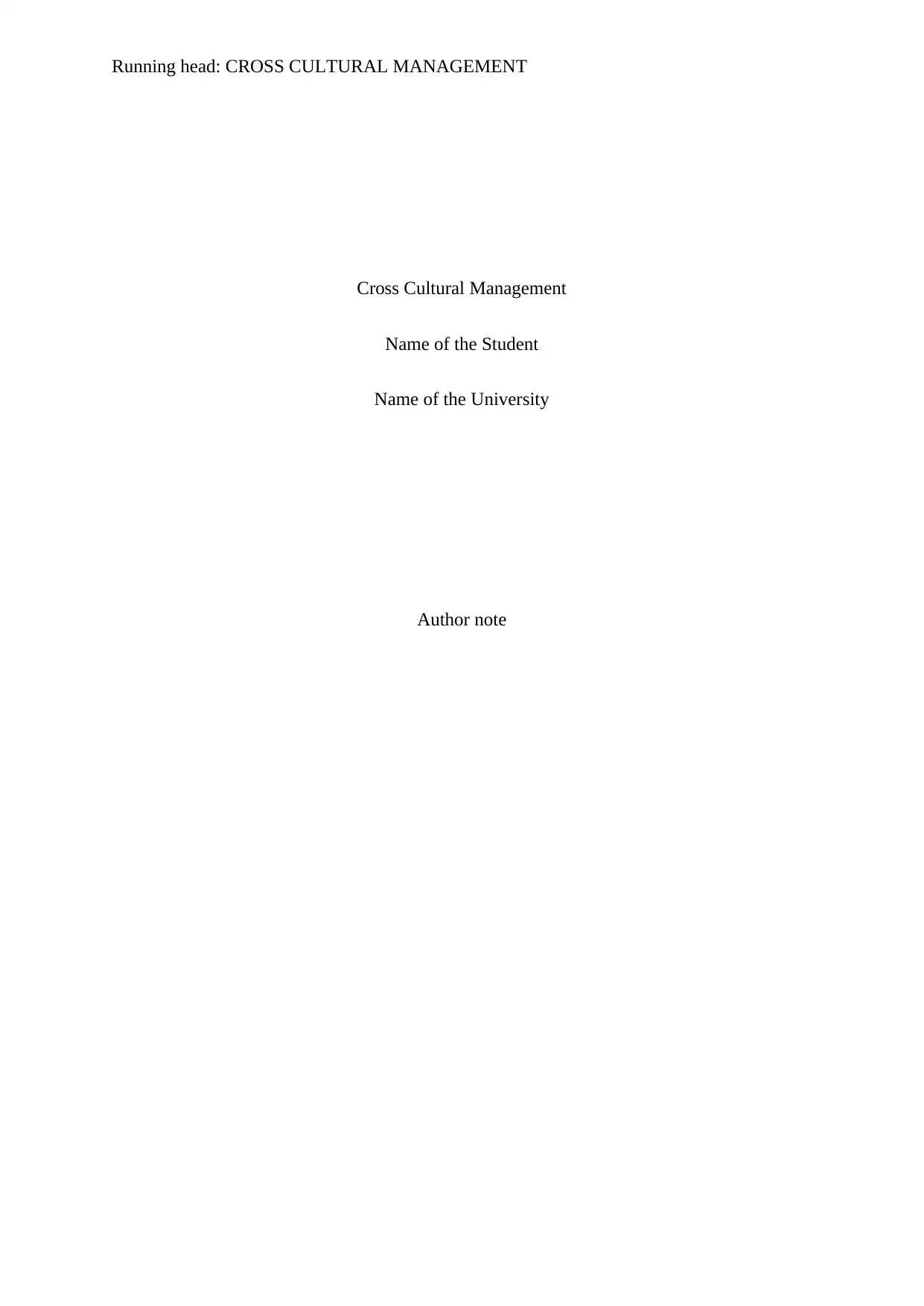
Running head: CROSS CULTURAL MANAGEMENT
Cross Cultural Management
Name of the Student
Name of the University
Author note
Cross Cultural Management
Name of the Student
Name of the University
Author note
Paraphrase This Document
Need a fresh take? Get an instant paraphrase of this document with our AI Paraphraser
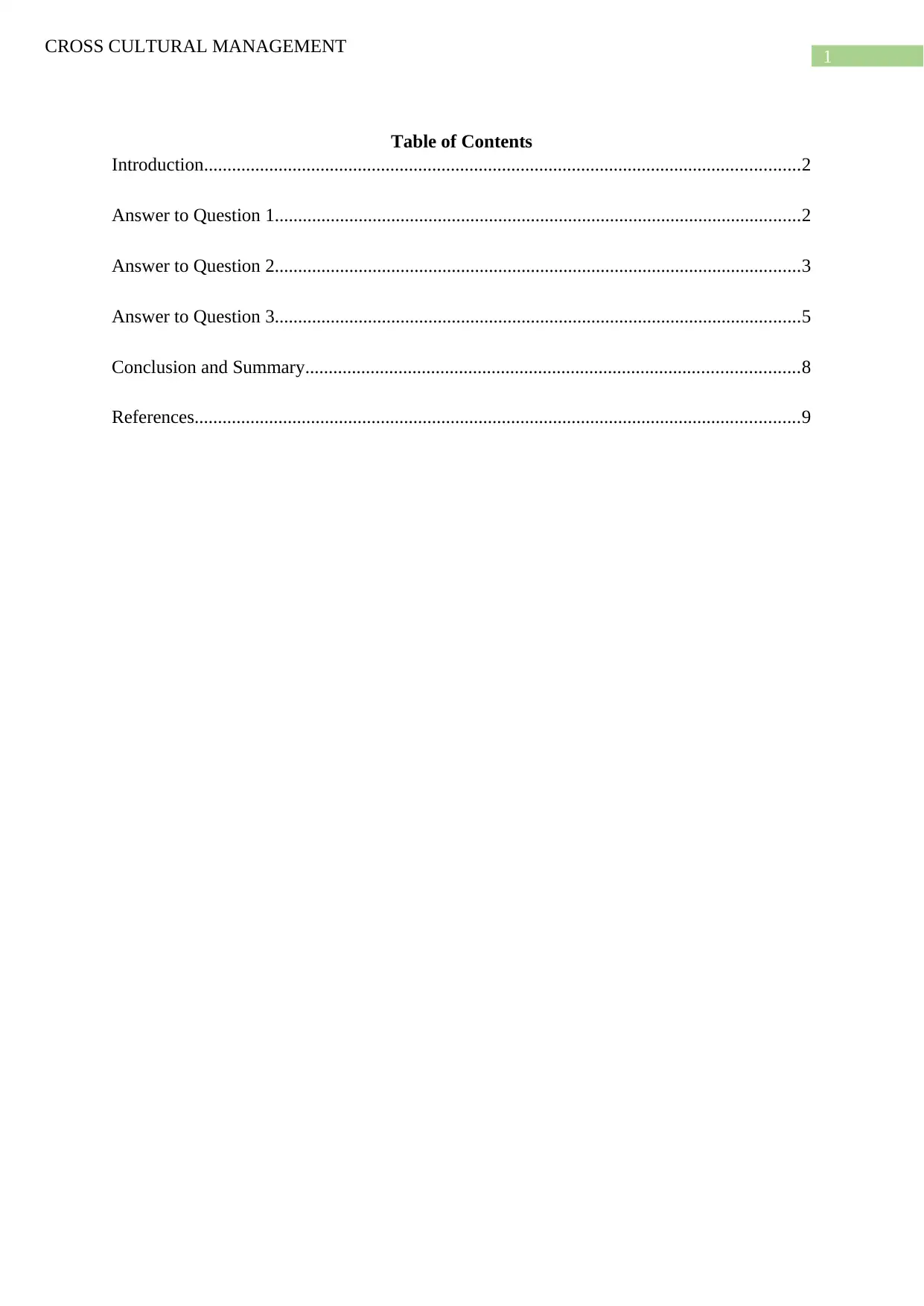
1
CROSS CULTURAL MANAGEMENT
Table of Contents
Introduction................................................................................................................................2
Answer to Question 1.................................................................................................................2
Answer to Question 2.................................................................................................................3
Answer to Question 3.................................................................................................................5
Conclusion and Summary..........................................................................................................8
References..................................................................................................................................9
CROSS CULTURAL MANAGEMENT
Table of Contents
Introduction................................................................................................................................2
Answer to Question 1.................................................................................................................2
Answer to Question 2.................................................................................................................3
Answer to Question 3.................................................................................................................5
Conclusion and Summary..........................................................................................................8
References..................................................................................................................................9
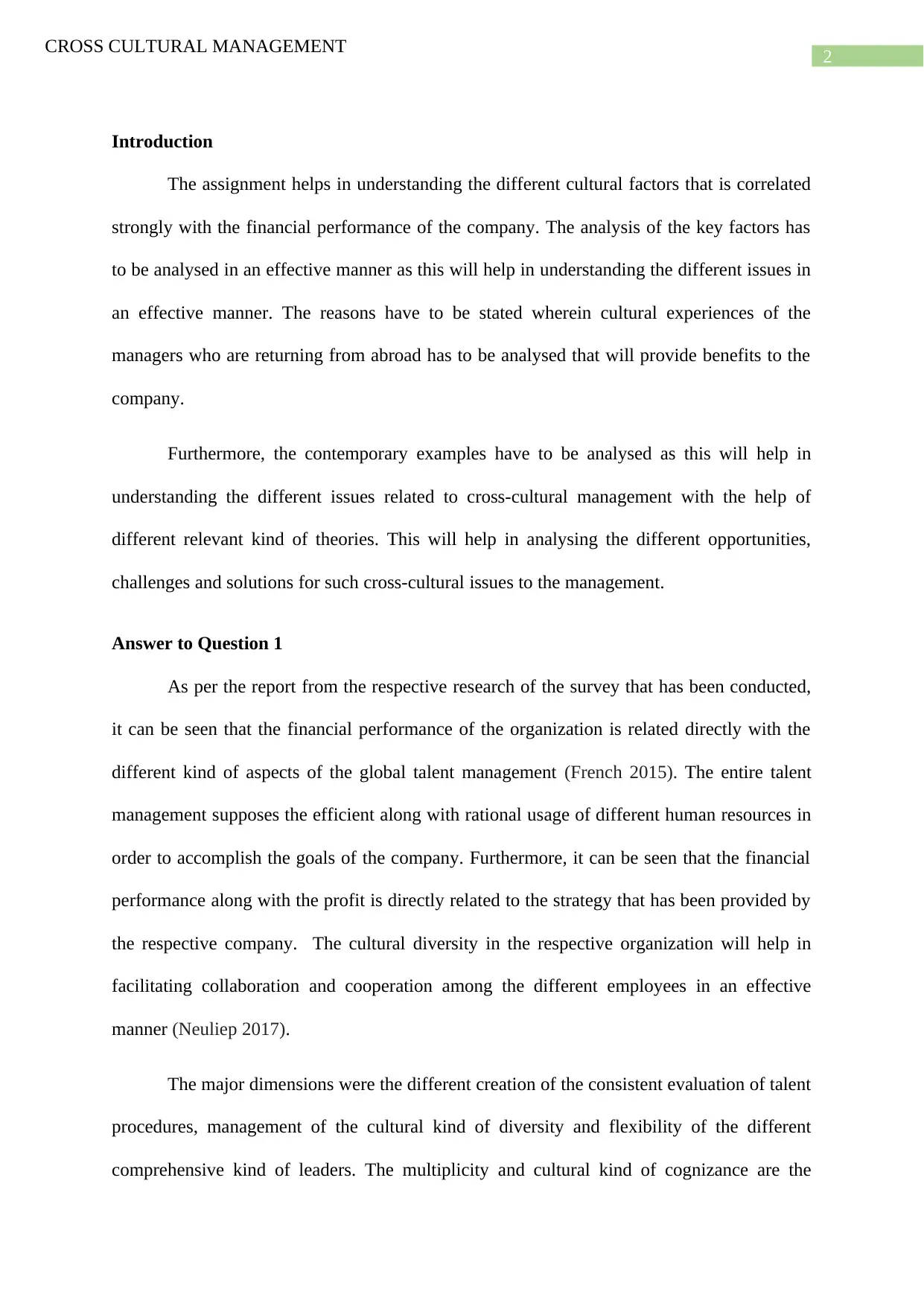
2
CROSS CULTURAL MANAGEMENT
Introduction
The assignment helps in understanding the different cultural factors that is correlated
strongly with the financial performance of the company. The analysis of the key factors has
to be analysed in an effective manner as this will help in understanding the different issues in
an effective manner. The reasons have to be stated wherein cultural experiences of the
managers who are returning from abroad has to be analysed that will provide benefits to the
company.
Furthermore, the contemporary examples have to be analysed as this will help in
understanding the different issues related to cross-cultural management with the help of
different relevant kind of theories. This will help in analysing the different opportunities,
challenges and solutions for such cross-cultural issues to the management.
Answer to Question 1
As per the report from the respective research of the survey that has been conducted,
it can be seen that the financial performance of the organization is related directly with the
different kind of aspects of the global talent management (French 2015). The entire talent
management supposes the efficient along with rational usage of different human resources in
order to accomplish the goals of the company. Furthermore, it can be seen that the financial
performance along with the profit is directly related to the strategy that has been provided by
the respective company. The cultural diversity in the respective organization will help in
facilitating collaboration and cooperation among the different employees in an effective
manner (Neuliep 2017).
The major dimensions were the different creation of the consistent evaluation of talent
procedures, management of the cultural kind of diversity and flexibility of the different
comprehensive kind of leaders. The multiplicity and cultural kind of cognizance are the
CROSS CULTURAL MANAGEMENT
Introduction
The assignment helps in understanding the different cultural factors that is correlated
strongly with the financial performance of the company. The analysis of the key factors has
to be analysed in an effective manner as this will help in understanding the different issues in
an effective manner. The reasons have to be stated wherein cultural experiences of the
managers who are returning from abroad has to be analysed that will provide benefits to the
company.
Furthermore, the contemporary examples have to be analysed as this will help in
understanding the different issues related to cross-cultural management with the help of
different relevant kind of theories. This will help in analysing the different opportunities,
challenges and solutions for such cross-cultural issues to the management.
Answer to Question 1
As per the report from the respective research of the survey that has been conducted,
it can be seen that the financial performance of the organization is related directly with the
different kind of aspects of the global talent management (French 2015). The entire talent
management supposes the efficient along with rational usage of different human resources in
order to accomplish the goals of the company. Furthermore, it can be seen that the financial
performance along with the profit is directly related to the strategy that has been provided by
the respective company. The cultural diversity in the respective organization will help in
facilitating collaboration and cooperation among the different employees in an effective
manner (Neuliep 2017).
The major dimensions were the different creation of the consistent evaluation of talent
procedures, management of the cultural kind of diversity and flexibility of the different
comprehensive kind of leaders. The multiplicity and cultural kind of cognizance are the
⊘ This is a preview!⊘
Do you want full access?
Subscribe today to unlock all pages.

Trusted by 1+ million students worldwide
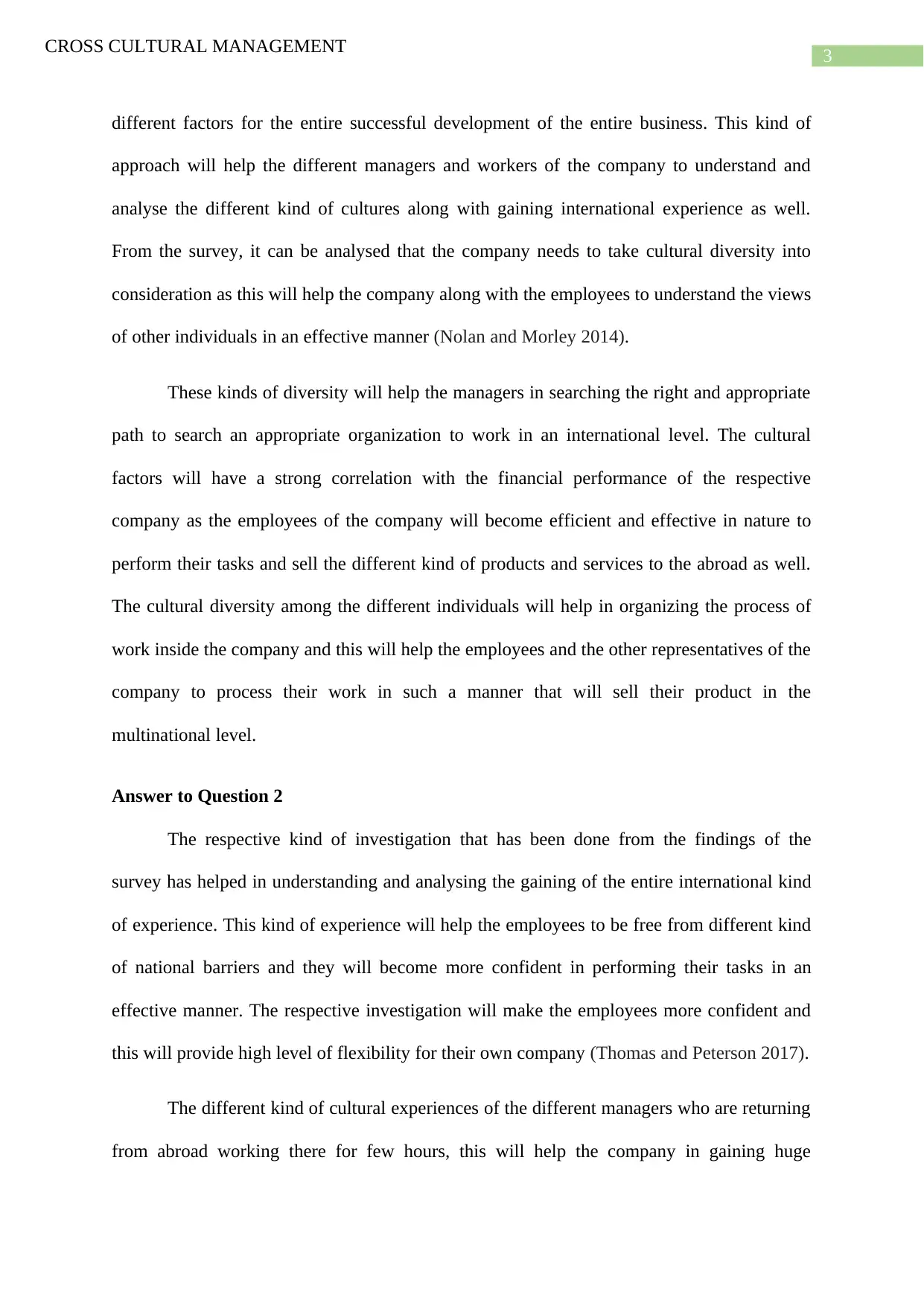
3
CROSS CULTURAL MANAGEMENT
different factors for the entire successful development of the entire business. This kind of
approach will help the different managers and workers of the company to understand and
analyse the different kind of cultures along with gaining international experience as well.
From the survey, it can be analysed that the company needs to take cultural diversity into
consideration as this will help the company along with the employees to understand the views
of other individuals in an effective manner (Nolan and Morley 2014).
These kinds of diversity will help the managers in searching the right and appropriate
path to search an appropriate organization to work in an international level. The cultural
factors will have a strong correlation with the financial performance of the respective
company as the employees of the company will become efficient and effective in nature to
perform their tasks and sell the different kind of products and services to the abroad as well.
The cultural diversity among the different individuals will help in organizing the process of
work inside the company and this will help the employees and the other representatives of the
company to process their work in such a manner that will sell their product in the
multinational level.
Answer to Question 2
The respective kind of investigation that has been done from the findings of the
survey has helped in understanding and analysing the gaining of the entire international kind
of experience. This kind of experience will help the employees to be free from different kind
of national barriers and they will become more confident in performing their tasks in an
effective manner. The respective investigation will make the employees more confident and
this will provide high level of flexibility for their own company (Thomas and Peterson 2017).
The different kind of cultural experiences of the different managers who are returning
from abroad working there for few hours, this will help the company in gaining huge
CROSS CULTURAL MANAGEMENT
different factors for the entire successful development of the entire business. This kind of
approach will help the different managers and workers of the company to understand and
analyse the different kind of cultures along with gaining international experience as well.
From the survey, it can be analysed that the company needs to take cultural diversity into
consideration as this will help the company along with the employees to understand the views
of other individuals in an effective manner (Nolan and Morley 2014).
These kinds of diversity will help the managers in searching the right and appropriate
path to search an appropriate organization to work in an international level. The cultural
factors will have a strong correlation with the financial performance of the respective
company as the employees of the company will become efficient and effective in nature to
perform their tasks and sell the different kind of products and services to the abroad as well.
The cultural diversity among the different individuals will help in organizing the process of
work inside the company and this will help the employees and the other representatives of the
company to process their work in such a manner that will sell their product in the
multinational level.
Answer to Question 2
The respective kind of investigation that has been done from the findings of the
survey has helped in understanding and analysing the gaining of the entire international kind
of experience. This kind of experience will help the employees to be free from different kind
of national barriers and they will become more confident in performing their tasks in an
effective manner. The respective investigation will make the employees more confident and
this will provide high level of flexibility for their own company (Thomas and Peterson 2017).
The different kind of cultural experiences of the different managers who are returning
from abroad working there for few hours, this will help the company in gaining huge
Paraphrase This Document
Need a fresh take? Get an instant paraphrase of this document with our AI Paraphraser
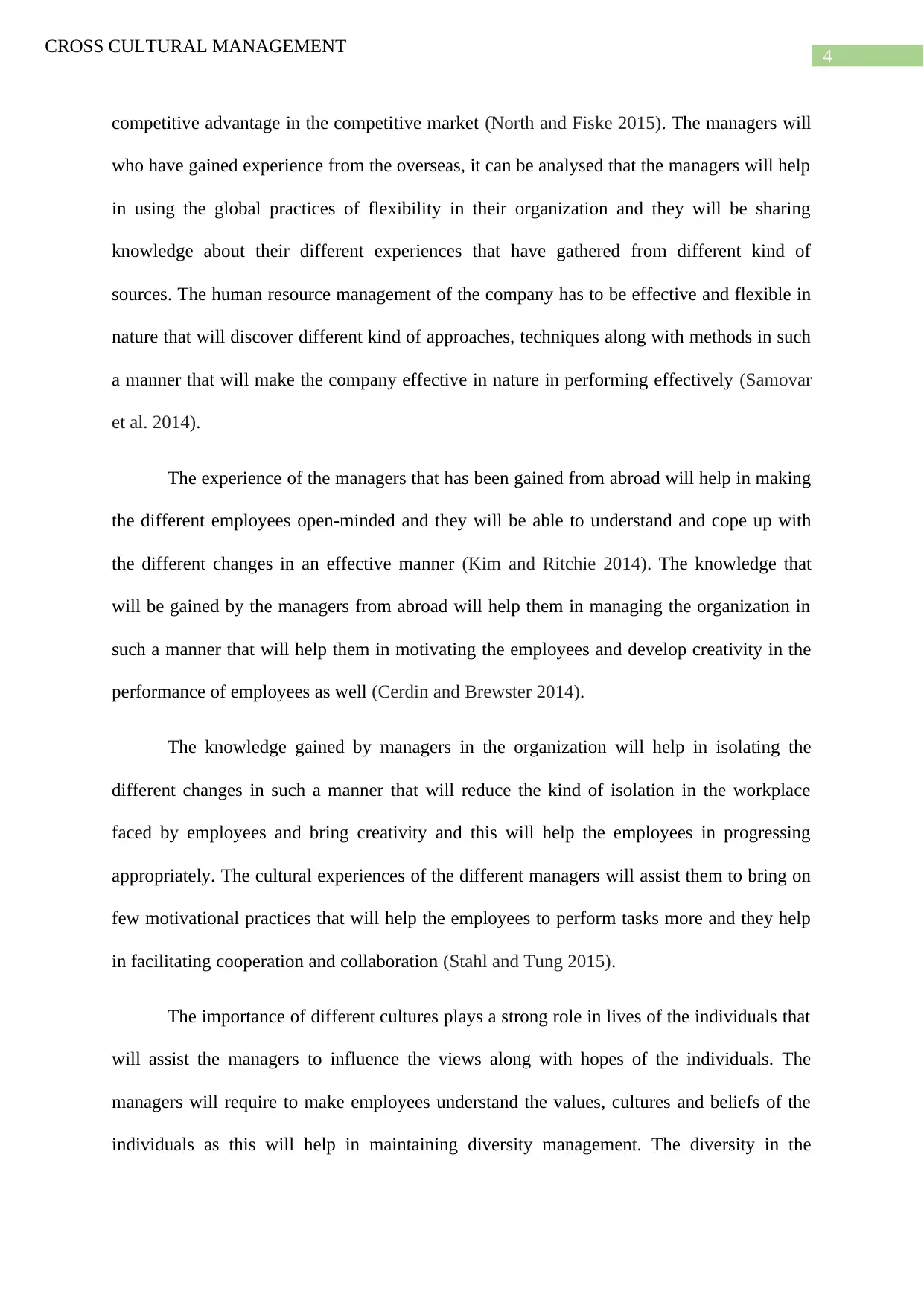
4
CROSS CULTURAL MANAGEMENT
competitive advantage in the competitive market (North and Fiske 2015). The managers will
who have gained experience from the overseas, it can be analysed that the managers will help
in using the global practices of flexibility in their organization and they will be sharing
knowledge about their different experiences that have gathered from different kind of
sources. The human resource management of the company has to be effective and flexible in
nature that will discover different kind of approaches, techniques along with methods in such
a manner that will make the company effective in nature in performing effectively (Samovar
et al. 2014).
The experience of the managers that has been gained from abroad will help in making
the different employees open-minded and they will be able to understand and cope up with
the different changes in an effective manner (Kim and Ritchie 2014). The knowledge that
will be gained by the managers from abroad will help them in managing the organization in
such a manner that will help them in motivating the employees and develop creativity in the
performance of employees as well (Cerdin and Brewster 2014).
The knowledge gained by managers in the organization will help in isolating the
different changes in such a manner that will reduce the kind of isolation in the workplace
faced by employees and bring creativity and this will help the employees in progressing
appropriately. The cultural experiences of the different managers will assist them to bring on
few motivational practices that will help the employees to perform tasks more and they help
in facilitating cooperation and collaboration (Stahl and Tung 2015).
The importance of different cultures plays a strong role in lives of the individuals that
will assist the managers to influence the views along with hopes of the individuals. The
managers will require to make employees understand the values, cultures and beliefs of the
individuals as this will help in maintaining diversity management. The diversity in the
CROSS CULTURAL MANAGEMENT
competitive advantage in the competitive market (North and Fiske 2015). The managers will
who have gained experience from the overseas, it can be analysed that the managers will help
in using the global practices of flexibility in their organization and they will be sharing
knowledge about their different experiences that have gathered from different kind of
sources. The human resource management of the company has to be effective and flexible in
nature that will discover different kind of approaches, techniques along with methods in such
a manner that will make the company effective in nature in performing effectively (Samovar
et al. 2014).
The experience of the managers that has been gained from abroad will help in making
the different employees open-minded and they will be able to understand and cope up with
the different changes in an effective manner (Kim and Ritchie 2014). The knowledge that
will be gained by the managers from abroad will help them in managing the organization in
such a manner that will help them in motivating the employees and develop creativity in the
performance of employees as well (Cerdin and Brewster 2014).
The knowledge gained by managers in the organization will help in isolating the
different changes in such a manner that will reduce the kind of isolation in the workplace
faced by employees and bring creativity and this will help the employees in progressing
appropriately. The cultural experiences of the different managers will assist them to bring on
few motivational practices that will help the employees to perform tasks more and they help
in facilitating cooperation and collaboration (Stahl and Tung 2015).
The importance of different cultures plays a strong role in lives of the individuals that
will assist the managers to influence the views along with hopes of the individuals. The
managers will require to make employees understand the values, cultures and beliefs of the
individuals as this will help in maintaining diversity management. The diversity in the
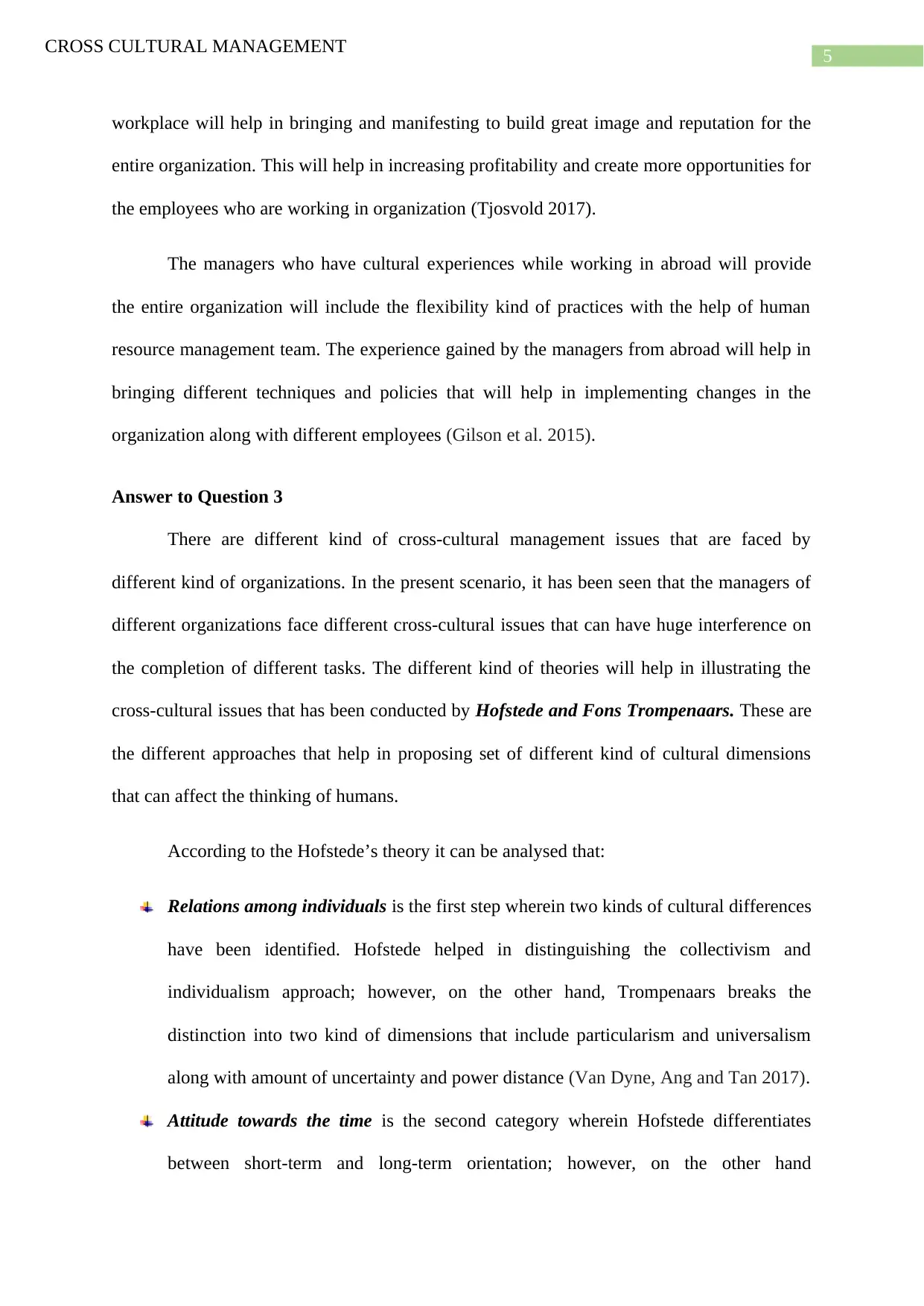
5
CROSS CULTURAL MANAGEMENT
workplace will help in bringing and manifesting to build great image and reputation for the
entire organization. This will help in increasing profitability and create more opportunities for
the employees who are working in organization (Tjosvold 2017).
The managers who have cultural experiences while working in abroad will provide
the entire organization will include the flexibility kind of practices with the help of human
resource management team. The experience gained by the managers from abroad will help in
bringing different techniques and policies that will help in implementing changes in the
organization along with different employees (Gilson et al. 2015).
Answer to Question 3
There are different kind of cross-cultural management issues that are faced by
different kind of organizations. In the present scenario, it has been seen that the managers of
different organizations face different cross-cultural issues that can have huge interference on
the completion of different tasks. The different kind of theories will help in illustrating the
cross-cultural issues that has been conducted by Hofstede and Fons Trompenaars. These are
the different approaches that help in proposing set of different kind of cultural dimensions
that can affect the thinking of humans.
According to the Hofstede’s theory it can be analysed that:
Relations among individuals is the first step wherein two kinds of cultural differences
have been identified. Hofstede helped in distinguishing the collectivism and
individualism approach; however, on the other hand, Trompenaars breaks the
distinction into two kind of dimensions that include particularism and universalism
along with amount of uncertainty and power distance (Van Dyne, Ang and Tan 2017).
Attitude towards the time is the second category wherein Hofstede differentiates
between short-term and long-term orientation; however, on the other hand
CROSS CULTURAL MANAGEMENT
workplace will help in bringing and manifesting to build great image and reputation for the
entire organization. This will help in increasing profitability and create more opportunities for
the employees who are working in organization (Tjosvold 2017).
The managers who have cultural experiences while working in abroad will provide
the entire organization will include the flexibility kind of practices with the help of human
resource management team. The experience gained by the managers from abroad will help in
bringing different techniques and policies that will help in implementing changes in the
organization along with different employees (Gilson et al. 2015).
Answer to Question 3
There are different kind of cross-cultural management issues that are faced by
different kind of organizations. In the present scenario, it has been seen that the managers of
different organizations face different cross-cultural issues that can have huge interference on
the completion of different tasks. The different kind of theories will help in illustrating the
cross-cultural issues that has been conducted by Hofstede and Fons Trompenaars. These are
the different approaches that help in proposing set of different kind of cultural dimensions
that can affect the thinking of humans.
According to the Hofstede’s theory it can be analysed that:
Relations among individuals is the first step wherein two kinds of cultural differences
have been identified. Hofstede helped in distinguishing the collectivism and
individualism approach; however, on the other hand, Trompenaars breaks the
distinction into two kind of dimensions that include particularism and universalism
along with amount of uncertainty and power distance (Van Dyne, Ang and Tan 2017).
Attitude towards the time is the second category wherein Hofstede differentiates
between short-term and long-term orientation; however, on the other hand
⊘ This is a preview!⊘
Do you want full access?
Subscribe today to unlock all pages.

Trusted by 1+ million students worldwide
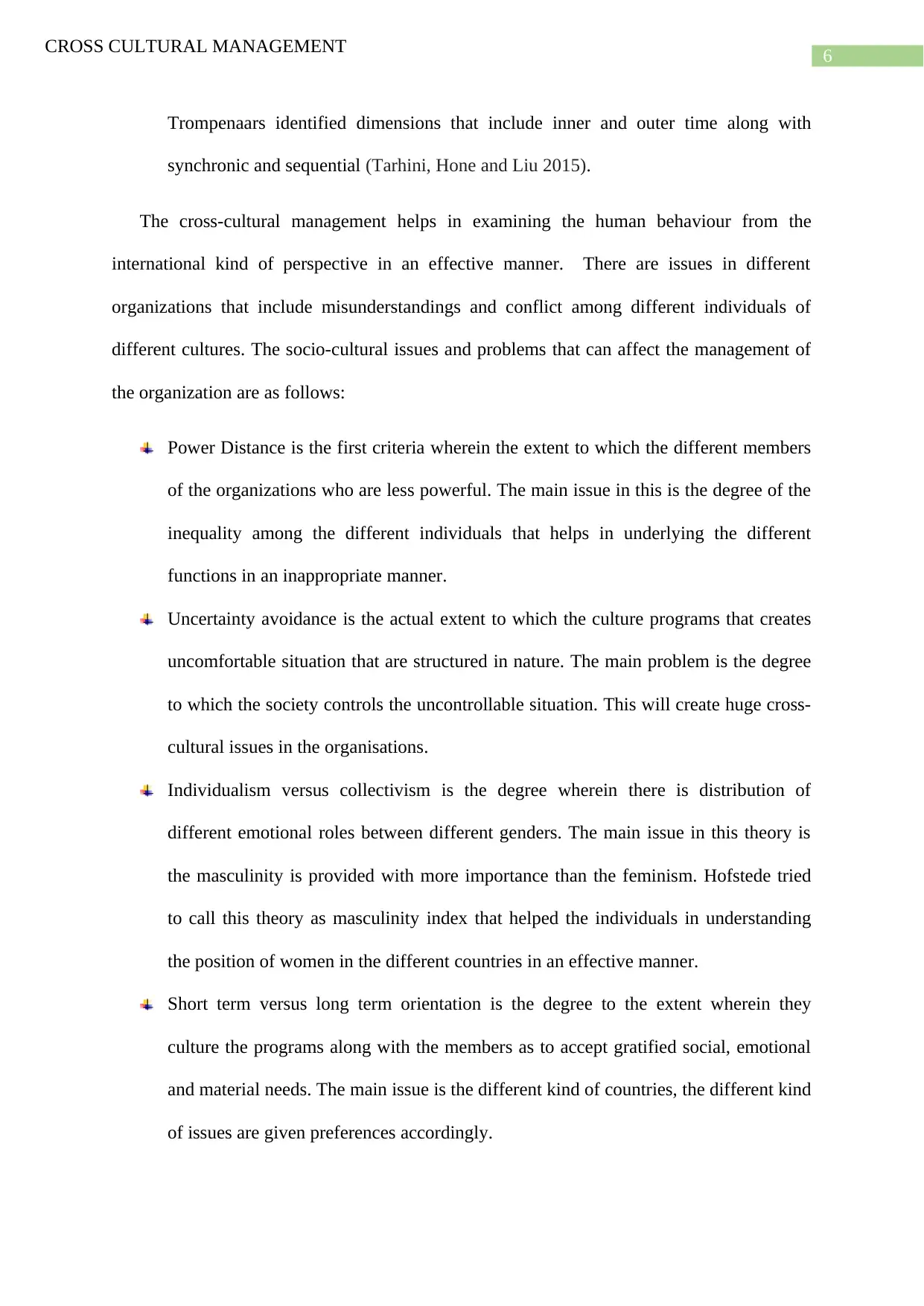
6
CROSS CULTURAL MANAGEMENT
Trompenaars identified dimensions that include inner and outer time along with
synchronic and sequential (Tarhini, Hone and Liu 2015).
The cross-cultural management helps in examining the human behaviour from the
international kind of perspective in an effective manner. There are issues in different
organizations that include misunderstandings and conflict among different individuals of
different cultures. The socio-cultural issues and problems that can affect the management of
the organization are as follows:
Power Distance is the first criteria wherein the extent to which the different members
of the organizations who are less powerful. The main issue in this is the degree of the
inequality among the different individuals that helps in underlying the different
functions in an inappropriate manner.
Uncertainty avoidance is the actual extent to which the culture programs that creates
uncomfortable situation that are structured in nature. The main problem is the degree
to which the society controls the uncontrollable situation. This will create huge cross-
cultural issues in the organisations.
Individualism versus collectivism is the degree wherein there is distribution of
different emotional roles between different genders. The main issue in this theory is
the masculinity is provided with more importance than the feminism. Hofstede tried
to call this theory as masculinity index that helped the individuals in understanding
the position of women in the different countries in an effective manner.
Short term versus long term orientation is the degree to the extent wherein they
culture the programs along with the members as to accept gratified social, emotional
and material needs. The main issue is the different kind of countries, the different kind
of issues are given preferences accordingly.
CROSS CULTURAL MANAGEMENT
Trompenaars identified dimensions that include inner and outer time along with
synchronic and sequential (Tarhini, Hone and Liu 2015).
The cross-cultural management helps in examining the human behaviour from the
international kind of perspective in an effective manner. There are issues in different
organizations that include misunderstandings and conflict among different individuals of
different cultures. The socio-cultural issues and problems that can affect the management of
the organization are as follows:
Power Distance is the first criteria wherein the extent to which the different members
of the organizations who are less powerful. The main issue in this is the degree of the
inequality among the different individuals that helps in underlying the different
functions in an inappropriate manner.
Uncertainty avoidance is the actual extent to which the culture programs that creates
uncomfortable situation that are structured in nature. The main problem is the degree
to which the society controls the uncontrollable situation. This will create huge cross-
cultural issues in the organisations.
Individualism versus collectivism is the degree wherein there is distribution of
different emotional roles between different genders. The main issue in this theory is
the masculinity is provided with more importance than the feminism. Hofstede tried
to call this theory as masculinity index that helped the individuals in understanding
the position of women in the different countries in an effective manner.
Short term versus long term orientation is the degree to the extent wherein they
culture the programs along with the members as to accept gratified social, emotional
and material needs. The main issue is the different kind of countries, the different kind
of issues are given preferences accordingly.
Paraphrase This Document
Need a fresh take? Get an instant paraphrase of this document with our AI Paraphraser
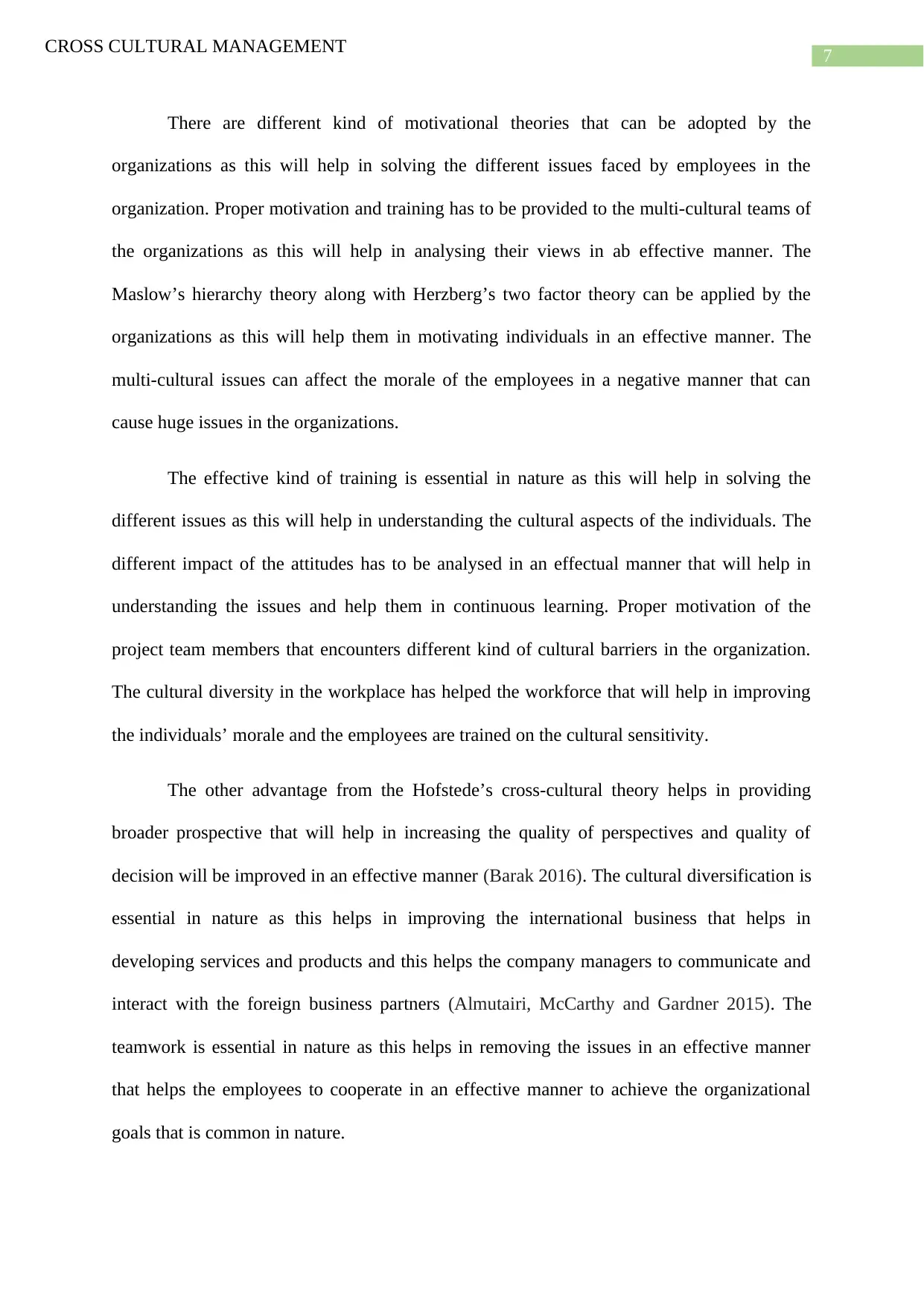
7
CROSS CULTURAL MANAGEMENT
There are different kind of motivational theories that can be adopted by the
organizations as this will help in solving the different issues faced by employees in the
organization. Proper motivation and training has to be provided to the multi-cultural teams of
the organizations as this will help in analysing their views in ab effective manner. The
Maslow’s hierarchy theory along with Herzberg’s two factor theory can be applied by the
organizations as this will help them in motivating individuals in an effective manner. The
multi-cultural issues can affect the morale of the employees in a negative manner that can
cause huge issues in the organizations.
The effective kind of training is essential in nature as this will help in solving the
different issues as this will help in understanding the cultural aspects of the individuals. The
different impact of the attitudes has to be analysed in an effectual manner that will help in
understanding the issues and help them in continuous learning. Proper motivation of the
project team members that encounters different kind of cultural barriers in the organization.
The cultural diversity in the workplace has helped the workforce that will help in improving
the individuals’ morale and the employees are trained on the cultural sensitivity.
The other advantage from the Hofstede’s cross-cultural theory helps in providing
broader prospective that will help in increasing the quality of perspectives and quality of
decision will be improved in an effective manner (Barak 2016). The cultural diversification is
essential in nature as this helps in improving the international business that helps in
developing services and products and this helps the company managers to communicate and
interact with the foreign business partners (Almutairi, McCarthy and Gardner 2015). The
teamwork is essential in nature as this helps in removing the issues in an effective manner
that helps the employees to cooperate in an effective manner to achieve the organizational
goals that is common in nature.
CROSS CULTURAL MANAGEMENT
There are different kind of motivational theories that can be adopted by the
organizations as this will help in solving the different issues faced by employees in the
organization. Proper motivation and training has to be provided to the multi-cultural teams of
the organizations as this will help in analysing their views in ab effective manner. The
Maslow’s hierarchy theory along with Herzberg’s two factor theory can be applied by the
organizations as this will help them in motivating individuals in an effective manner. The
multi-cultural issues can affect the morale of the employees in a negative manner that can
cause huge issues in the organizations.
The effective kind of training is essential in nature as this will help in solving the
different issues as this will help in understanding the cultural aspects of the individuals. The
different impact of the attitudes has to be analysed in an effectual manner that will help in
understanding the issues and help them in continuous learning. Proper motivation of the
project team members that encounters different kind of cultural barriers in the organization.
The cultural diversity in the workplace has helped the workforce that will help in improving
the individuals’ morale and the employees are trained on the cultural sensitivity.
The other advantage from the Hofstede’s cross-cultural theory helps in providing
broader prospective that will help in increasing the quality of perspectives and quality of
decision will be improved in an effective manner (Barak 2016). The cultural diversification is
essential in nature as this helps in improving the international business that helps in
developing services and products and this helps the company managers to communicate and
interact with the foreign business partners (Almutairi, McCarthy and Gardner 2015). The
teamwork is essential in nature as this helps in removing the issues in an effective manner
that helps the employees to cooperate in an effective manner to achieve the organizational
goals that is common in nature.
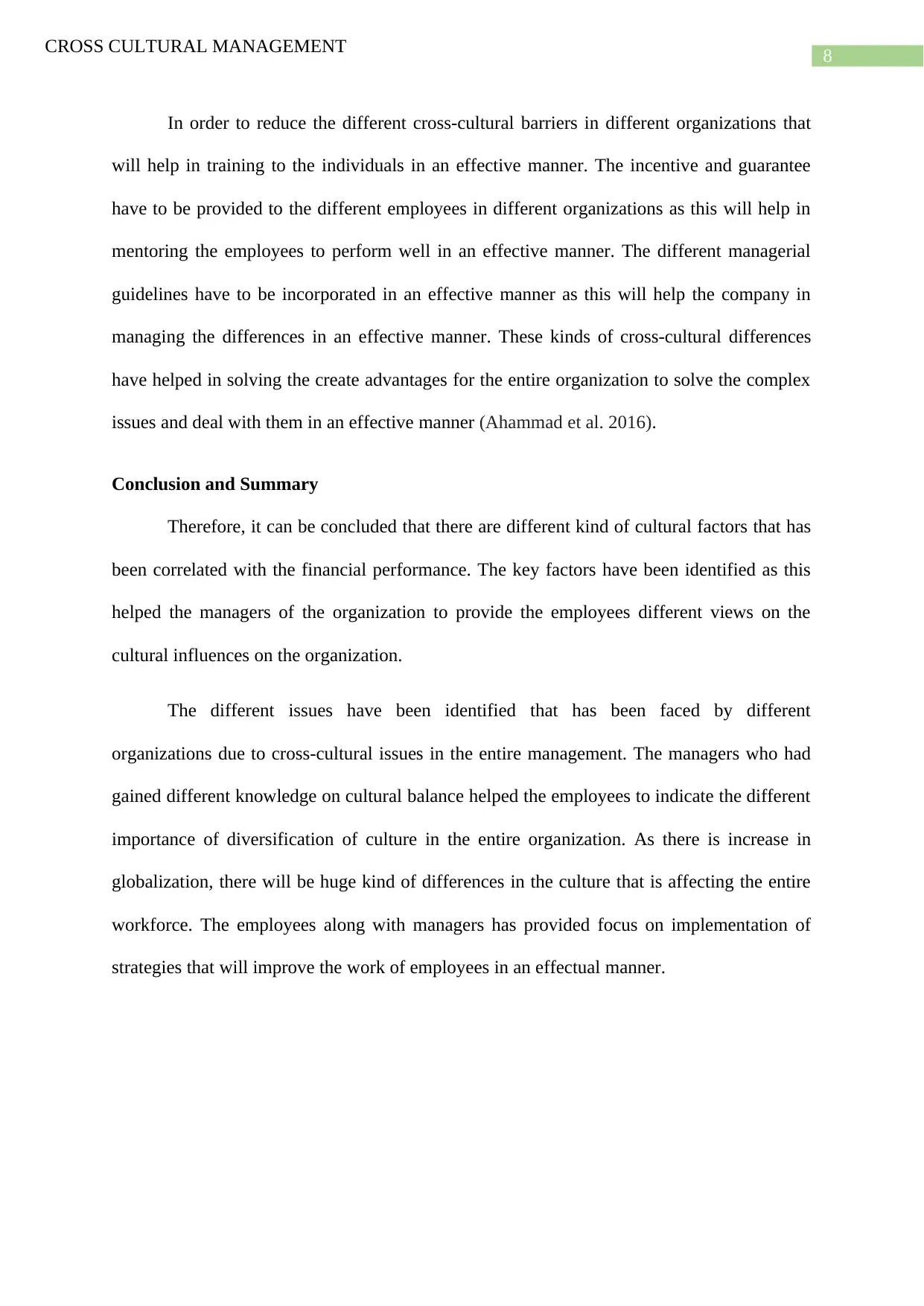
8
CROSS CULTURAL MANAGEMENT
In order to reduce the different cross-cultural barriers in different organizations that
will help in training to the individuals in an effective manner. The incentive and guarantee
have to be provided to the different employees in different organizations as this will help in
mentoring the employees to perform well in an effective manner. The different managerial
guidelines have to be incorporated in an effective manner as this will help the company in
managing the differences in an effective manner. These kinds of cross-cultural differences
have helped in solving the create advantages for the entire organization to solve the complex
issues and deal with them in an effective manner (Ahammad et al. 2016).
Conclusion and Summary
Therefore, it can be concluded that there are different kind of cultural factors that has
been correlated with the financial performance. The key factors have been identified as this
helped the managers of the organization to provide the employees different views on the
cultural influences on the organization.
The different issues have been identified that has been faced by different
organizations due to cross-cultural issues in the entire management. The managers who had
gained different knowledge on cultural balance helped the employees to indicate the different
importance of diversification of culture in the entire organization. As there is increase in
globalization, there will be huge kind of differences in the culture that is affecting the entire
workforce. The employees along with managers has provided focus on implementation of
strategies that will improve the work of employees in an effectual manner.
CROSS CULTURAL MANAGEMENT
In order to reduce the different cross-cultural barriers in different organizations that
will help in training to the individuals in an effective manner. The incentive and guarantee
have to be provided to the different employees in different organizations as this will help in
mentoring the employees to perform well in an effective manner. The different managerial
guidelines have to be incorporated in an effective manner as this will help the company in
managing the differences in an effective manner. These kinds of cross-cultural differences
have helped in solving the create advantages for the entire organization to solve the complex
issues and deal with them in an effective manner (Ahammad et al. 2016).
Conclusion and Summary
Therefore, it can be concluded that there are different kind of cultural factors that has
been correlated with the financial performance. The key factors have been identified as this
helped the managers of the organization to provide the employees different views on the
cultural influences on the organization.
The different issues have been identified that has been faced by different
organizations due to cross-cultural issues in the entire management. The managers who had
gained different knowledge on cultural balance helped the employees to indicate the different
importance of diversification of culture in the entire organization. As there is increase in
globalization, there will be huge kind of differences in the culture that is affecting the entire
workforce. The employees along with managers has provided focus on implementation of
strategies that will improve the work of employees in an effectual manner.
⊘ This is a preview!⊘
Do you want full access?
Subscribe today to unlock all pages.

Trusted by 1+ million students worldwide
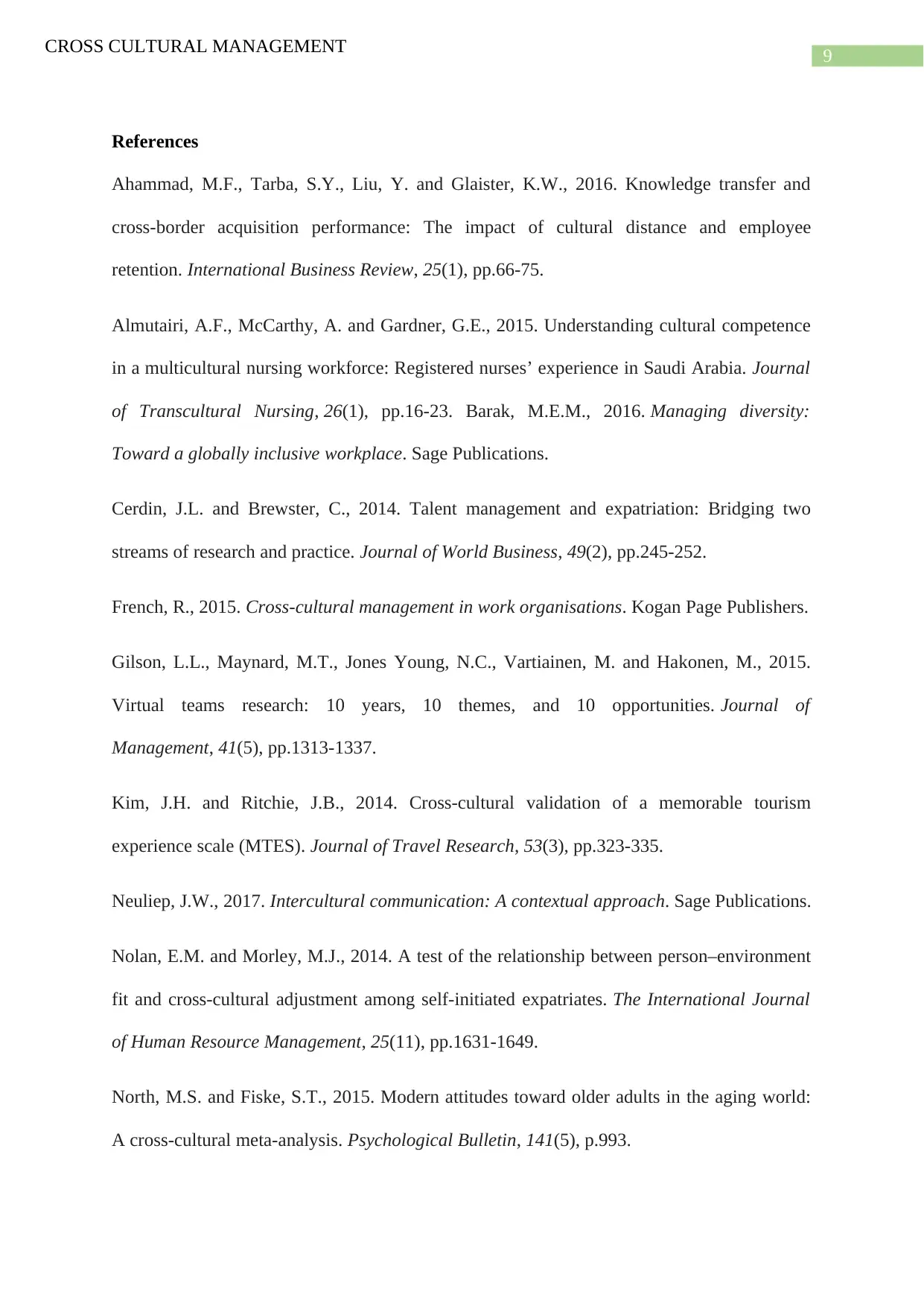
9
CROSS CULTURAL MANAGEMENT
References
Ahammad, M.F., Tarba, S.Y., Liu, Y. and Glaister, K.W., 2016. Knowledge transfer and
cross-border acquisition performance: The impact of cultural distance and employee
retention. International Business Review, 25(1), pp.66-75.
Almutairi, A.F., McCarthy, A. and Gardner, G.E., 2015. Understanding cultural competence
in a multicultural nursing workforce: Registered nurses’ experience in Saudi Arabia. Journal
of Transcultural Nursing, 26(1), pp.16-23. Barak, M.E.M., 2016. Managing diversity:
Toward a globally inclusive workplace. Sage Publications.
Cerdin, J.L. and Brewster, C., 2014. Talent management and expatriation: Bridging two
streams of research and practice. Journal of World Business, 49(2), pp.245-252.
French, R., 2015. Cross-cultural management in work organisations. Kogan Page Publishers.
Gilson, L.L., Maynard, M.T., Jones Young, N.C., Vartiainen, M. and Hakonen, M., 2015.
Virtual teams research: 10 years, 10 themes, and 10 opportunities. Journal of
Management, 41(5), pp.1313-1337.
Kim, J.H. and Ritchie, J.B., 2014. Cross-cultural validation of a memorable tourism
experience scale (MTES). Journal of Travel Research, 53(3), pp.323-335.
Neuliep, J.W., 2017. Intercultural communication: A contextual approach. Sage Publications.
Nolan, E.M. and Morley, M.J., 2014. A test of the relationship between person–environment
fit and cross-cultural adjustment among self-initiated expatriates. The International Journal
of Human Resource Management, 25(11), pp.1631-1649.
North, M.S. and Fiske, S.T., 2015. Modern attitudes toward older adults in the aging world:
A cross-cultural meta-analysis. Psychological Bulletin, 141(5), p.993.
CROSS CULTURAL MANAGEMENT
References
Ahammad, M.F., Tarba, S.Y., Liu, Y. and Glaister, K.W., 2016. Knowledge transfer and
cross-border acquisition performance: The impact of cultural distance and employee
retention. International Business Review, 25(1), pp.66-75.
Almutairi, A.F., McCarthy, A. and Gardner, G.E., 2015. Understanding cultural competence
in a multicultural nursing workforce: Registered nurses’ experience in Saudi Arabia. Journal
of Transcultural Nursing, 26(1), pp.16-23. Barak, M.E.M., 2016. Managing diversity:
Toward a globally inclusive workplace. Sage Publications.
Cerdin, J.L. and Brewster, C., 2014. Talent management and expatriation: Bridging two
streams of research and practice. Journal of World Business, 49(2), pp.245-252.
French, R., 2015. Cross-cultural management in work organisations. Kogan Page Publishers.
Gilson, L.L., Maynard, M.T., Jones Young, N.C., Vartiainen, M. and Hakonen, M., 2015.
Virtual teams research: 10 years, 10 themes, and 10 opportunities. Journal of
Management, 41(5), pp.1313-1337.
Kim, J.H. and Ritchie, J.B., 2014. Cross-cultural validation of a memorable tourism
experience scale (MTES). Journal of Travel Research, 53(3), pp.323-335.
Neuliep, J.W., 2017. Intercultural communication: A contextual approach. Sage Publications.
Nolan, E.M. and Morley, M.J., 2014. A test of the relationship between person–environment
fit and cross-cultural adjustment among self-initiated expatriates. The International Journal
of Human Resource Management, 25(11), pp.1631-1649.
North, M.S. and Fiske, S.T., 2015. Modern attitudes toward older adults in the aging world:
A cross-cultural meta-analysis. Psychological Bulletin, 141(5), p.993.
Paraphrase This Document
Need a fresh take? Get an instant paraphrase of this document with our AI Paraphraser
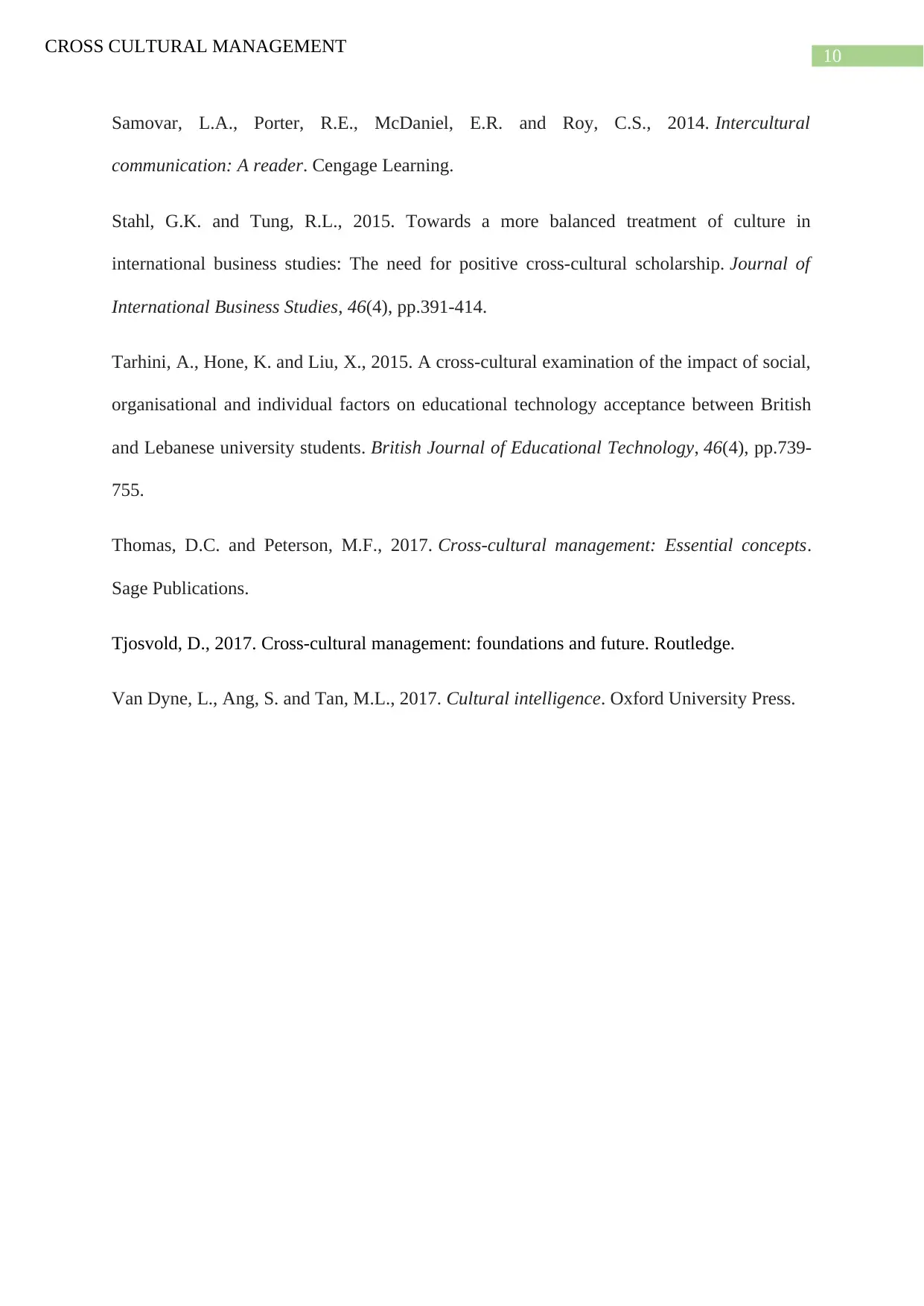
10
CROSS CULTURAL MANAGEMENT
Samovar, L.A., Porter, R.E., McDaniel, E.R. and Roy, C.S., 2014. Intercultural
communication: A reader. Cengage Learning.
Stahl, G.K. and Tung, R.L., 2015. Towards a more balanced treatment of culture in
international business studies: The need for positive cross-cultural scholarship. Journal of
International Business Studies, 46(4), pp.391-414.
Tarhini, A., Hone, K. and Liu, X., 2015. A cross‐cultural examination of the impact of social,
organisational and individual factors on educational technology acceptance between British
and Lebanese university students. British Journal of Educational Technology, 46(4), pp.739-
755.
Thomas, D.C. and Peterson, M.F., 2017. Cross-cultural management: Essential concepts.
Sage Publications.
Tjosvold, D., 2017. Cross-cultural management: foundations and future. Routledge.
Van Dyne, L., Ang, S. and Tan, M.L., 2017. Cultural intelligence. Oxford University Press.
CROSS CULTURAL MANAGEMENT
Samovar, L.A., Porter, R.E., McDaniel, E.R. and Roy, C.S., 2014. Intercultural
communication: A reader. Cengage Learning.
Stahl, G.K. and Tung, R.L., 2015. Towards a more balanced treatment of culture in
international business studies: The need for positive cross-cultural scholarship. Journal of
International Business Studies, 46(4), pp.391-414.
Tarhini, A., Hone, K. and Liu, X., 2015. A cross‐cultural examination of the impact of social,
organisational and individual factors on educational technology acceptance between British
and Lebanese university students. British Journal of Educational Technology, 46(4), pp.739-
755.
Thomas, D.C. and Peterson, M.F., 2017. Cross-cultural management: Essential concepts.
Sage Publications.
Tjosvold, D., 2017. Cross-cultural management: foundations and future. Routledge.
Van Dyne, L., Ang, S. and Tan, M.L., 2017. Cultural intelligence. Oxford University Press.
1 out of 11
Related Documents
Your All-in-One AI-Powered Toolkit for Academic Success.
+13062052269
info@desklib.com
Available 24*7 on WhatsApp / Email
![[object Object]](/_next/static/media/star-bottom.7253800d.svg)
Unlock your academic potential
Copyright © 2020–2026 A2Z Services. All Rights Reserved. Developed and managed by ZUCOL.





